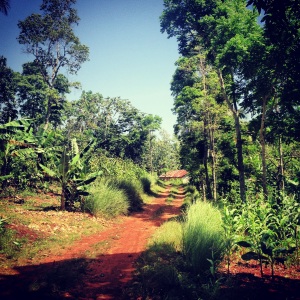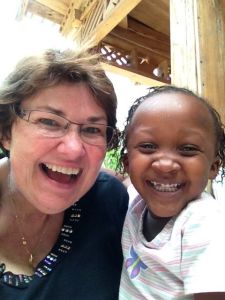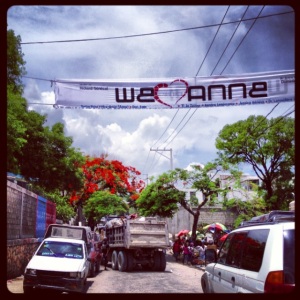I still catch myself wanting to be a savior.
I know better, of course. I am in Haiti to work with farmer organizations, to share the stories of their work and to help advocate on their behalf. But getting started in the work is slow-going — my journeys out to meet with people from each group are spaced a few weeks apart, and my Creole still prohibits me from doing more of the planning myself.
So I practice my new language by settling into my new life in Port-au-Prince, sharing time and meals with friends here and learning patience. At least try to learn patience. It’s not easy, because as I am just figuring out, I am SO American. I like to set goals and see results. I like to control at least some of the things that will happen in my day. At the very least, I’d like to know what might happen in my day.
And this has not been the case.
So in three months, when I thought I would be well settled into a routine and begin the real work of being here, I’m just becoming acquainted with this new me. And one of the toughest parts of that is realizing that my ego gets in the way of pretty much everything I try to do. I do not like that sinking feeling when I catch myself wanting to save somebody.
I’m not talking about saving as in saving someone’s soul. If anything can show me just how naïve and unsophisticated my own spiritual faith, it’s spending time in a place like Haiti. I’m talking about “helping my neighbor” by giving them things. I’m on the verge of becoming that person I don’t like — you know, the one that when you just want to share your problems they want to “fix” everything. I don’t like that. And I don’t like this urge I have to “fix” stuff here.
For starters, I can’t.
I come from an ordinary town in Virginia. We have pockets of poor and a social system that’s more or less segregated. People with wealth socialize with similar people, and the poor gather in different places. I was fortunate to feel comfortable with people from all walks, and mostly I spent time in the middle. It’s easy to do in America — zoning laws take care of that. Our governments carefully zone neighborhoods by how much money someone has. Big houses with lots of lawn on in one area, and tiny plots of land with small houses fill other areas. We invest many dollars in the streets of some parts of a city, and other areas come last.
But in places like Haiti, though there are “better” neighborhoods and “slums”, you cannot avoid the poverty.
For a place where most people live on less than $2 U.S. a day, a lot of people are selling them things. Markets crowd into the street, and many families make a little extra by buying candy, household items and food to sell to other people.
These merchants are as poor as their customers.
Children, some as young as 7 or 8, walk among the vehicles on busy thoroughfares carrying rags. They will swipe the rag across the windshield and hope the driver will hand them a few gourdes.
I’ve started carrying small bills to hand out when I see them, but that doesn’t concern me. What bothers me is the way I feel when I hear their quiet thank yous.
God didn’t send me here to hand out change. I think he sent me here to help make a change. And I need the patience to wait for that chance.
When left to my own devices for too long, I can let a deep-seated sense of guilt take over. The words of Luke 12: 48 come to mind: “From everyone who has been given much, much will be demanded.”
But the rest of that verse of Luke gives me the rest of what is required of me. “And from the one who has been entrusted with much, much more will be asked.”
There’s nothing wrong with handing out a few gourdes to hard working kids. I know myself well enough that I will keep doing that. What I need to change is my motivation for doing so. I cannot respond to the needs of the economically poor to enrich my spiritual poverty. I need to find that place in which I am with my brothers and sisters, sharing with them the good and the bad and together, finding God’s grace. This is a big task to accomplish in the singular glance between a child standing the heat with a dusty cloth and me in the comfort of a shiny vehicle. I want that child to see the face of someone who cares deeply about his circumstances, who wants to work toward a larger change that will mean he’s at him home being a kid, not working the dangerous streets to help feed his family. Only then can I honestly give him a small wage for his work and accept his thanks — not with pleasure at my giving, but with pleasure for our exchange.
I am blessed to live here, and I am more blessed to work here. The work of my assigned mission will come, but until then, my work is in the day-to-day: Nurturing friendships with the people around me, accepting their gifts of openness, advice and companionship, sharing meals that I provide and those of my friends and learning everything I can about this place that God and I so love.
And a part of that work is carefully discerning this new me that is being molded here, watching and listening for clues that I’m going off path.
It’s a beautiful journey, though it’s sometimes hard.
I’m not saving anyone in Haiti, but I can feel the saving grace I’m finding here. It’s beneath my wings.
I am blessed, and I am glad you are here with me.









